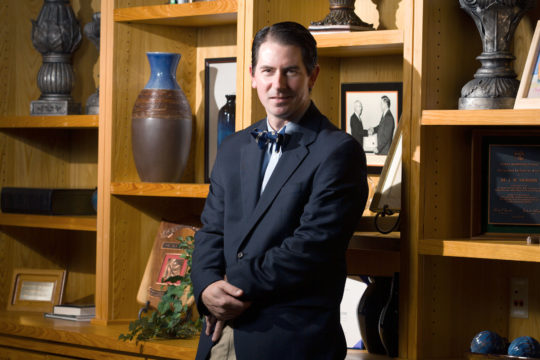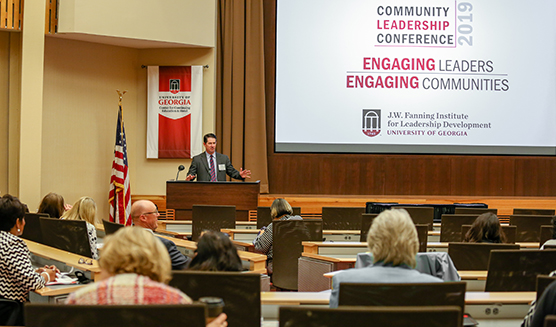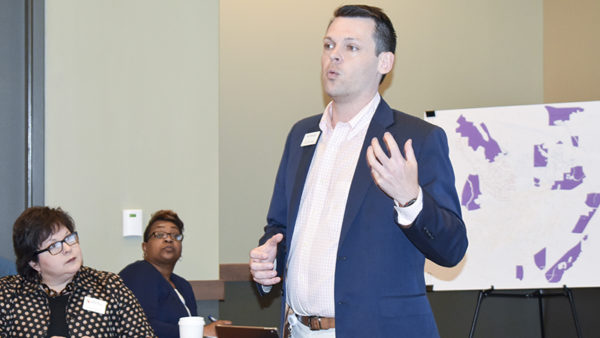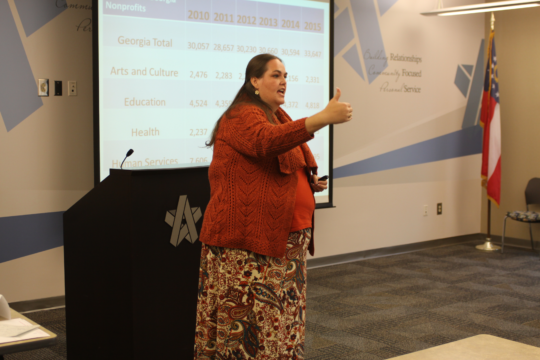The UGA Department of Public Administration and Policy looks to train and prepare public servants and research professionals. Most frequently, these groups are distinct: MPA graduates go on to careers as practitioners in all levels of government and the nonprofit sector, while PhD graduates find placements at the top research institutions across the globe.
Occasionally, however, these twin missions of practice and scholarship converge. UGA’s status as a land-grant university allows for special relationships between academic departments and Public Service and Outreach (PSO) units, through which the academic lessons of public administration are applied to real-life state and local challenges. One such unit is the J.W. Fanning Institute for Leadership Development, founded in 1982 to strengthen Georgia communities, organizations, and individuals through leadership development, training, and education. Over the years, this partnership has built value for students, faculty, and the community.
MATT BISHOP
 Current Director Matt Bishop, who holds both an MPA (’99) and a PhD (’12) from SPIA, is uniquely positioned to discuss this symbiosis. After earning his MPA, Bishop worked for the Governor’s Rural Development Council and the Georgia Department of Community Affairs before returning to UGA in 2002 as public service faculty. Bishop’s careers has included appointments in multiple PSO units, including the Carl Vinson Institute of Government and the Archway Partnership.
Current Director Matt Bishop, who holds both an MPA (’99) and a PhD (’12) from SPIA, is uniquely positioned to discuss this symbiosis. After earning his MPA, Bishop worked for the Governor’s Rural Development Council and the Georgia Department of Community Affairs before returning to UGA in 2002 as public service faculty. Bishop’s careers has included appointments in multiple PSO units, including the Carl Vinson Institute of Government and the Archway Partnership.
“My whole career grew from that fundamental, basic training in the MPA program,” he said. “It taught me the differences between the public and the private sector, helped me navigate complex challenges in the work that I do for state government, and grounded me so well. I gained such a solid foundation for successful community economic development work.”
When colleagues encouraged Bishop to earn a doctoral degree, UGA was the obvious choice.
“At that point, I was working on what is now known as the Study on Persistent Poverty in the South (2003), a look at seven southeastern states through a lot of secondary-source Census data,” he said. “My work in the PhD program complemented that and made me a better qualitative and quantitative researcher and team member. Those research skills and econometric modeling lend themselves very well to application.”
Beyond statistical and data analysis skills, Bishop also utilizes lessons from personnel and management courses. He has regularly interviewed public servants, making good use of “soft skills” honed at SPIA.

Bishop speaks at the fifth annual Community Leadership Conference, Feb. 4-5, 2020, at the UGA Center for Continuing Education & Hotel. Organized by UGA’s J.W. Fanning Institute for Leadership Advancement, the conference draws participants from across Georgia as well as from neighboring states.
“[When I interviewed] someone with an MPA, particularly from UGA, they always seemed to fare better,” he said. “Working with community leaders, be they elected officials, non-profit/social services people, or business owners, means that you have to have great interpersonal and communication skills and you have to know what you are doing. . . I think it speaks to the notion that the MPA really prepares you for a career in public service.”
Fanning’s particular mission of leadership development draws students to its internship, fellowship, and assistantship opportunities as well.
“We are out there preparing individuals for leadership opportunities in their communities, in Georgia and beyond,” he said. “In doing that, we have to stay up to date with the latest literature on leadership, adult education, curriculum and instruction, and any and everything that impacts community leadership. What better students to help us with that?”
TYLER REINAGEL
Dozens of SPIA students have participated in hands-on experience at Fanning, supporting actual state and local projects through research, program design, and, at times, implementation. One such student is Tyler Reinagel (MPA, ’09; PhD, ‘13), now Associate Vice President of Economic Development at Kennesaw State University and a member of the SPIA Alumni Board. Reinagel worked as a doctoral fellow at the Fanning Institute from 2009-2013, focusing on a project called “Issues Identification and Economic Development Self-Assessment” for the City of Hinesville, in Coastal Georgia.

Reinagel talks to the LaGrange City Council about tourism at the LaGrange City Council Retreat in his role as the director of the office of planning and research for the Georgia Department of Community Affairs in 2019. (Alicia B. Hill | The LaGrange Daily News)
“This effort, an early step in the City’s visioning and strategic planning process, allowed me to work ‘on the ground’ with Fanning faculty in Hinesville to better understand the challenges facing the city, the perceptions and role of local youth, and the desires of citizens for a more vibrant and inviting community,” Reinagel said.
Successful community development professionals, he continued, must show a commitment to listening and learning best honed through practice.
“Being a part of this project in Hinesville was critical in my future work, driving home the fact that communities have their own unique character, citizenry, priorities, and goals,” he said. “Community solutions are never ‘one-size fits-all,’ and while it takes a great deal of time and effort, the only path to successful community economic development is to understand what makes the community unique.”
To this end, Reinagel recommends that public service students balance academic training with full community immersion.
“Walk the fine line between the academic ‘ivory tower’ and City Hall,” he advised. “While much can be learned from books, academic journals, and research papers, work in local government and community economic development requires you to walk the tightrope between the theoretical and the practical. When you’re working with communities, you must invest in the community. Humility, accessibility, and approachability are critical in building the rapport and mutual confidence you need to do your job effectively.”
REBECCA NESBIT

Rebecca Nesbit teaches her First Year Odyssey seminar, ” American Generosity: Nonprofit Organizations, Volunteering, and Philanthropy in the U.S.”
SPIA Associate Professor Rebecca Nesbit is also a fan of this balance. Nesbit, who teaches nonprofit courses in the Department of Public Administration and Policy, has found many opportunities to apply her research through Fanning and other PSO initiatives. She spent a semester as a Fanning fellow, helped create and inform the Interdisciplinary Alliance for Non-profits at UGA, and currently serves on the design and implementation team for the PSO Faculty Scholarship Academy, which helps public service faculty advance their research agenda.
“PSO faculty have some advantages [over traditional academics] when it comes to research,” she said. “They are already in these organizations talking to the people that we would like to talk to. They have access to data and people doing the applied work.”
“The more I talk to practitioners, the better my research becomes, and the easier it is for me to interpret my results because I know and understand why I’m seeing what I’m seeing,” she went on. “It also goes the other way: research can really inform what PSO units do. There may be other opportunities to bring more evidence-based practices to PSO through partnerships with schools like SPIA.”
The Interdisciplinary Alliance for Non-profits at UGA connects local non-profit leaders with university resources, through coffee-hour brainstorming sessions, connections to trainings, networking, and Q&As, and deliverables such as salary studies and best practices. Meanwhile, representatives from various nonprofits compare notes to avoid redundancies in mission and service and share their needs.
“We invite people from the non-profit community and answer questions, like ‘How do you attract student interns to your organization?’’’ Nesbit continued. “I mean, we want what we do to matter for them, right? And we want our students to be able to connect with these organizations and have good experiences.”
This ongoing collaboration between the Department of Public Administration and Policy and the Fanning Institute has brought benefits to students, faculty, community efforts, and statewide leadership development, and boosts the reach and impact of these highly-ranked SPIA graduate programs.
“Whether we’re working with students on educational projects or faculty on real-world applications, the Fanning Institute is plugged in to SPIA pretty well,” said Bishop.
Reinagel credits the SPIA/Fanning partnership for building the sense of humanity needed to round out the lessons of his public service degrees.
“A diploma on your wall and an impressive resume mean nothing to communities if you’re not willing to take an active and genuine interest in their stories, their history, their struggles, their hopes, and their desires for what their community can be.”

